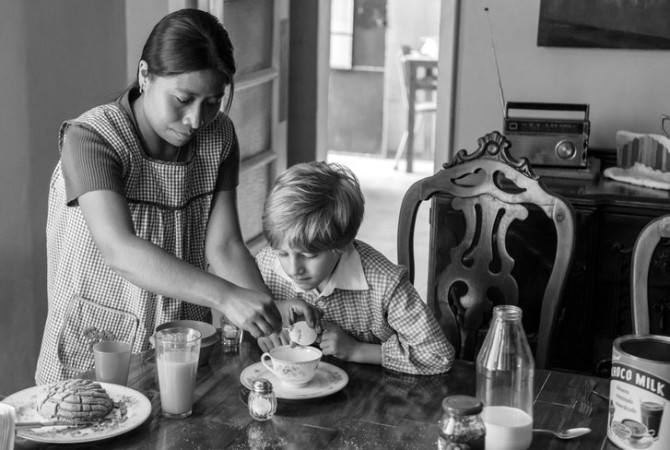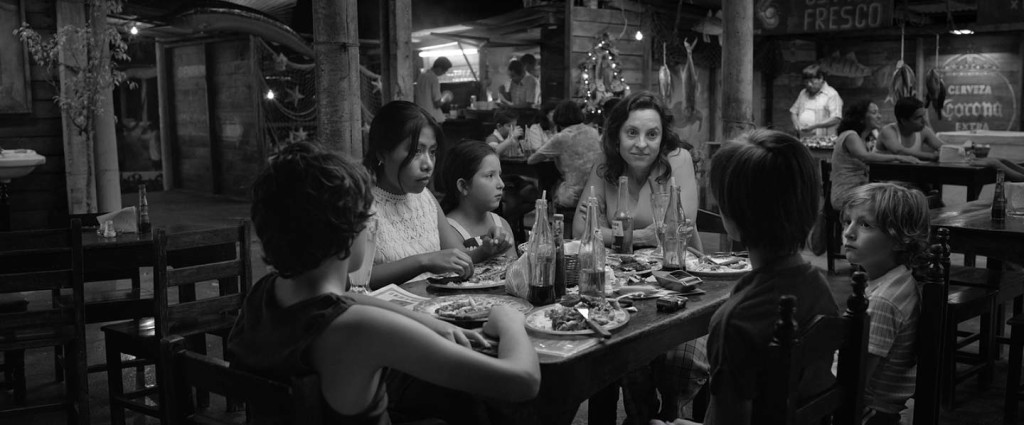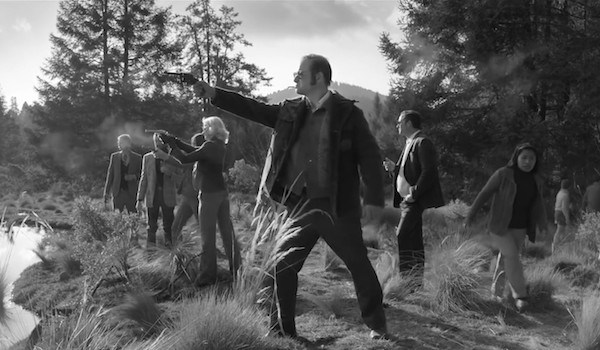Oscar Week is upon us. What better way to celebrate than review the film with the most Oscar nominations?
Genre: Drama
Premise: (from IMDB) A year in the life of a middle-class family’s maid in Mexico City in the early 1970s. Inspired by the director’s own childhood.
About: No studio would touch Roma. A black and white passion project without a single recognizable actor and a wandering unconventional narrative? It was as if the director was actively trying to make no one watch his film. However, that director, Alfonso Cuarón, knew Netflix was desperate to get that Oscar and got them to pony up the dough. It worked out for both parties. Cauron got to make his film and Netflix has the movie with the most Oscar nominations.
Writer: Alfonso Cuarón
Details: 2 hours and 12 minutes!
Everyone I’ve talked to who’s seen Roma has had the same reaction. “It was… good,” they say, the way you tell the host of a dinner party their Jamaican-inspired vegan potato salad was good. I’ll never understand the intimidation the average viewer feels to say they liked one of these “important” movies. If you don’t like something, SAY IT. You’re not wrong. We’re all entitled to our opinions.
If it sounds like I’ve got it in for this movie, let me offer some context. I have a huge issue with movies made strictly for critics. Critics aren’t real moviegoers. They don’t have to pay to see films. Movies are supposed to be made for the general population, people who pay. So when you bypass that demographic for the sole purpose of winning an award, I have no respect for you because you don’t have any respect for me. I’m a pawn being used for your awards speech.
Roma is the most relentless version of this. It is a movie that, literally, does not need an audience. It didn’t have a theatrical run so no one needed to see it. It was thrown on Netflix where, maybe, 12 people watched it all the way through. Didn’t matter. All that matters is that Netflix gets one of those gold guys.
I’ve personally attempted to watch this film half a dozen times. Every time I’ve fallen asleep within half an hour. So I drank a gallon of Coke and injected adrenaline directly into my veins, Crank style, this time in an attempt to make it through all 132 minutes of this overpriced sleeping aid in order to give you a definitive review. Let’s take a look…
Cleo is a maid. I know this because the first 30 minutes of this movie shows her cleaning the house. Eventually we learn that this is a middle class home in Mexico City at some point in the 1970s. Cleo’s love life begins to heat up when she meets a local guy who’s really into doing karate movies while naked. After the two sleep together, karate guy disappears.
Meanwhile, we spend more time in the home. More cleaning. More hanging out with the kids. More playing on the roof. More cleaning. More turning off lights. More cleaning dishes. More shots of sinks. More cleaning. More washing clothes. There’s some cleaning. Cleo and the other maid busts each other’s balls while cleaning. More drying clothes. And every once in awhile we get a very long scene of the husband or wife attempting to park their giant car in their very tiny garage. If they’d gotten rid of these scenes alone, the movie would’ve been half as long.
One day, the husband tells the wife that he’s leaving for work for several weeks. After this enormous bombshell of a plot point, we spend a lot of time either sight-seeing downtown or going out to the Mexican countryside. What these scenes have to do with the story is anyone’s guess. Might they be an excuse for some Oscar-worthy cinematography? Anyway, it eventually becomes clear that the husband isn’t coming back. Poor wife.
Meanwhile, in the other giant bombshell plot development, Cleo is pregnant! Oh no! Oh no indeed as we realize we need to spend 9 months with her to get to the end of this movie. And that’s exactly how long the rest of the movie feels. It wanders aimlessly, looking to fill in time before the climactic labor can occur. Cuarón even throws in some random riots in order to make the film look like it had a point. It didn’t. Lucky for us, the movie gives us a feel-good winner of an ending. Cleo’s baby is stillborn. Fin.
“Serious” filmmakers who care about the audience understand that storytelling is a compromise. They tell their meaningful story (the selfish part) but do so inside an entertaining package (the selfless part). Take District 9. Blomkamp wanted to say something about racism in South Africa. Did he give us a boring literal story about racism in South Africa? Of course not. Nobody would’ve watched it. He told the story through the lens of an alien arrival, using the aliens as stand-ins for the oppressed race. Not only is that WAY more effective at getting the message across, but it’s more entertaining as well.
Roma is a long dull achingly literal look at a family going through tough times. And I use that term (tough) loosely. The one thing I was looking forward to in this movie was the riots from the trailer, as they implied the movie was about something bigger. But the riots are tacked on. They don’t have anything to do with the plot. This movie comes down to two plot points – Cleo’s pregnant and the father leaves. That’s the only dramatic value you get for your two hour and 12 minute investment.
There are a select few times where these storylines resonate. It’s hard not to feel for the wife when her children spot their father running out of a movie theater with another woman after not seeing him in months. But here’s the problem. This movie is so set on being artsy (most of the film is shot like a fly on the wall, a 70s black and white Fellini version of a reality show) it forgets to do the basic things, like introduce us to characters so we KNOW THEM. I never got a single scene that featured the kids. They were always running around in the background. So how bad am I going to feel for them when their dad leaves? It’s more of a general feeling of sorrow. Like, “Man, that sucks.” It’s not that deep empathetic heavy feeling you get when a character you’ve gotten to know intimately experiences a loss.
Cuarón cares more about recreating time and place than he does these characters. We often find ourselves in random parts of the country (one day we’re on a river with a bunch of suburbanites shooting guns into the wilderness for no other reason than I assume it’s something Cuarón remembers happening as a kid). And while there’s no denying that Cuarón is a masterful filmmaker, the images are devoid of the emotion they so desperately want to convey. Why? Because there is no narrative here and no attempt to get to know these people. It is a specific person’s experience that is only meaningful to him as only he knows who these people are and how they affected him. When a blond haired Netherlandian man starts singing a sorrowful song while hundreds of locals attempt to put out a fire, I nearly yanked the wires out of my TV, ripped it off the wall, stormed up to my roof, and threw it into the street.
If you’re a cinematography geek or like foreign films with zero plot, check Roma out. There’s plenty to marvel at. But let’s be real. As a screenplay, this is an unmitigated disaster. There is no semblance of a narrative to even begin judging what’s happening storywise. It’s random, it’s pointless, and it’s boring.
[x] What the hell did I just stream?
[ ] wasn’t for me
[ ] worth the stream
[ ] impressive
[ ] genius
What I learned: There’s an old saying in writing – “No one cares about your boring life.” Everybody thinks their life is somehow worthy of a movie. If you haven’t been president, didn’t become a rags to riches success story, or weren’t involved in a national scandal, chances are your life isn’t worth telling onscreen. That doesn’t mean you can’t write about your life. You just need to find an exciting concept then subtly fit pieces of your life into the characters and events. A maid’s boring everyday life isn’t worthy of a movie. It just isn’t.





